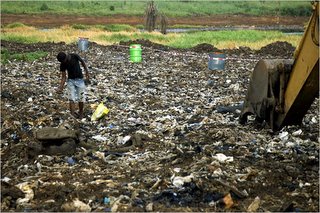Toxic Sludge and Law
 Between the book that I'm currently finishing up (A Civil Action by Jonathan Harr), and this recent article in the New York Times entitled "Global Sludge Ends in Tragedy for Ivory Coast," I've become excited at the prospect of going to law school in New York, a center of International Human Rights law, and someday being able to fight against the big, bad wolf-corporations that kill children using toxic chemical sludge. Hyperbole? Not Quite:
Between the book that I'm currently finishing up (A Civil Action by Jonathan Harr), and this recent article in the New York Times entitled "Global Sludge Ends in Tragedy for Ivory Coast," I've become excited at the prospect of going to law school in New York, a center of International Human Rights law, and someday being able to fight against the big, bad wolf-corporations that kill children using toxic chemical sludge. Hyperbole? Not Quite:"A Civil Action" is a true story about a couple of companies in Massachusetts that dumped chemical waste on their property, which contaminated the town water wells and ultimately caused several children to develop Leukemia and die at a young age. The familes affected were represented by a young lawyer who spent all of his firm's money and more on the case, "nearly losing everything--including his sanity" (back cover blurb), but who ultimately had his story chronicled in a book as well as a Hollywood movie, in which his character was played by John Travolta.
The Times article, dated October 2, about a "highly toxic cocktail of petrochemical waste and caustic soda" deposited in Abidjan, the capital city of the Ivory Coast, is framed as a sort of allegory in which the dark sludge represents all that is wrong with globalization:
It came from a Greek-owned tanker flying a Panamanian flag and leased by the London branch of a Swiss trading corporation whose fiscal headquarters are in the Netherlands. Safe disposal in Europe would have cost about $300,000, or perhaps twice that, counting the cost of delays. But because of decisions and actions made not only here but also in Europe, it was dumped on the doorstep of some of the world’s poorest people.I haven't stepped foot in law school yet, but I'm guessing that this is a dream scenario for professors of International Law looking to teach their students about jurisdiction. Appallingly, the sludge has already been blamed for eight deaths and hundreds of people are still being treated every day for various health problems arising as a result of exposure to the sludge. The Dutch public prosecutor has opened a criminal investigation regarding the dumping, and my guess is that it will be a while before any party is held accountable for this, whether that party is the company that produced the sludge and authorized the dumping, the laboratory whose limited analysis on the sludge incorrectly showed little to no toxicity, or the waste management company in the Ivory Coast that offered to take on the waste disposal project, even though everyone knew they had no capabilities for doing so.
Hopefully, more will be done for the victims of this mess than that other big (perhaps far bigger) disaster in Bhopal, India, 22 years ago, when the families of the thousands who died as a result of Union Carbide's toxic gas leak were given an average award of only $2,200, and the site of the accident continues to be highly contaminated and disease-inducing, with no one taking responsibility for the clean up. The head of PR at Dow Co., which now owns Union Carbide, was quoted as saying "$500 is plenty good for an Indian," referring to the amount that many of those who need lifelong medical care received.
If $500 is plenty good for an Indian, I'm scared of what may be deemed plenty good for an African.


0 Comments:
Post a Comment
<< Home